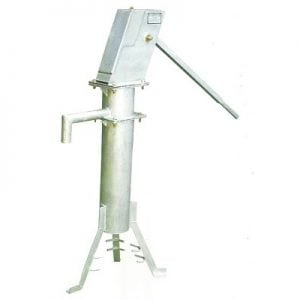
Agriculture
December 26, 2023
India Mark II Handpump
Read SolutionImplemented by
Mechanical Engineering Research & Development Organization (MERADO)
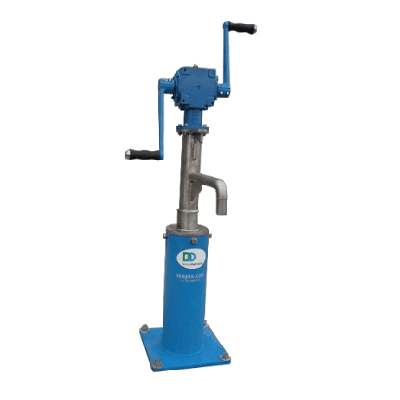
Updated on December 27, 2023
·Created on November 17, 2019
LifePump is a deep-well, progressive cavity hand pump designed to provide continuous water for rural communities.
LifePump is a progressive cavity hand pump. It is designed by humanitarian engineering nonprofit Design Outreach in partnership with World Vision, private donors and SEEPEX, a German-based pump manufacturer from Ohio which manufactures and provides the PC pumping element—the rotor and the stator—for the LifePump.
Target SDGs
SDG 6: Clean Water and Sanitation
SDG 1: No Poverty
Target Users (Target Impact Group)
Community
Distributors / Implementing Organizations
Design Outreach partners with other organizations such as World Vision and Water for Good to implement LifePumps. Other partners that have contributed to the development of the LifePump include: The Water Project, SEEPEX, and others. Design Outreach also works with Rotary clubs, such as Rotary Clubs of Delaware, New Albany, Tri-Village, Pataskala, and Sunbury-Galena in a project to make clean water more accessible in Haiti.
Competitive Landscape
Direct competitors include SOVEMA Universelle Extra Deep Hand Pump, Afridev Hand Pump, India Mark II Handpump, BluePump, Vergnet-Hydro 60-2000 Pump, and iDE Rope Pump.
Regions
Africa
Countries
Ethiopia, Haiti, Kenya, Malawi, Mali, Zambia
Manufacturing/Building Method
LifePump’s PC pumping elements are supplied by EEPEX, a German-based pump manufacturer based in Ohio, USA.
Intellectural Property Type
Trademark
User Provision Model
Each LifePump is funded by the support of donors. Companies, organizations or individuals can bring clean water to a village in Africa by sponsoring a pump campaign by contacting doutreach.org.
Distributions to Date Status
As of 2017, Design Outreach has installed more than 50 pumps in 9 countries including Malawi, Zambia, Kenya and Ethiopia and plans to reach 2.5 million people by 2030.
Pump type
Human powered
Power requirement (W)
N/A
Average flow rate (L/min at specific head)
Unknown
Maximum head (m)
100 m
Diameter (cm)
Unknown
Design Specifications
The LifePump consists of a stainless steel single helix metallic rotor that turns inside a double-helix elastomeric stator, located underneath at the bottom of the borehole. Both of these combined is called a progressive cavity pump (PCP).
When LifePump users turn the handles (in a clockwise rotary motion) mounted on a right-angle bevel gearbox, this rotates drive rods that are connected to the helix-shaped rotor. When the rotor turns relative to the stator, it creates progressing pockets of water that are pushed to the surface. This mechanism allows PCPs to pump from extreme depths, where piston or diaphragm-style pumps are unable to operate.
LifePump depth in comparison to other hand powered pumps
LifePump is designed to wear slowly over time by minimizing wear on parts to ensure that the pump lasts for years before needing maintenance; this prevents catastrophic failure that would leave users suddenly without water. This is accomplished in part by using heavy-duty components fabricated from stainless steel or, in some cases, high-strength steel that is coated or plated for optimal corrosion resistance.
LifePump's handle length, required handle torque, and height of the pump above ground are features engineered to be ergonomically ideal for women and children.
Technical Support
Local Design Outreach partners drill the wells, install the pumps, and provide proper maintenance and training to ensure LifePump lasts as long as possible before needing service. All of this is done in partnership with the local communities where LifePumps are installed.
Replacement Components
LifePump requires only preventive maintenance.
Lifecycle
LifePump is designed to last years in operation before needing maintenance. Its parts are designed to wear off slowly over time. LifePump can survive for at least 5 years. Its pilot program started in 2013 and improvements were incorporated in 2015, therefore its lifetime is currently being monitored in the field.
Manufacturer Specified Performance Parameters
The LifePump is designed to reach deeper ground, last longer than standard hand pumps available today, and provide a steady flow of water year-round. Designer specified performance targets include: durable, sustainable and appropriate technology for the communities it serves.
Vetted Performance Status
Design Outreach piloted its LifePump in five African countries, beginning in November 2013. Researchers at Messiah College independently evaluated the LifePump pilot in order to study its field and laboratory performance, to verify the effectiveness of the LifePump from technological and cultural standpoints.The study found that community members preferred the LifePump to standard hand pumps, because of its high durability, reduced maintenance, and ease of use. Independent analysis of LifePump components, showed no measurable signs of wear on critical components after 30 months of daily usage. The pilot program showed promising community acceptance, durability and cost effectiveness—helping to lead to improved sustainability.
Safety
Unknown
Complementary Technical Systems
The LifePump can be outfitted with remote monitors that mounts on the side of the pump the same way the spout would. This device tells how much water is pumped and provides timely and valuable feedback which can help water organizations become more effective in fulfilling their mission of delivering clean water to those in need.
Academic Research and References
Bixler, G., Stathulis, St., Haubert, T., Lakovic D., and Sivandran G., 2015, The LifePump Innovation for Developing Countries, Journal AWWA American Water Works Asociation 107: 5, pp. 48-54.
Fomich, A., Sours, P., and Bixler, G. D., 2018, An Innovative Approach to Teaching Appropriate Technology for Developing Countries, International Journal for Service Learning in Engineering, Humanitarian Engineering and Social Entrepreneurship, 13: 2, pp. 10-24, Fall, ISSN 1555-9033.
McGeorge, Kristin, 2014, The LifePump: A Strategy for Introducing Affordable Clean Water to the Developing World. Master dissertation, Rochester Institute of Technology, New York.“LifePump,” Doutreach.org. Available: https://tech.doutreach.org/available-technologies/lifepump/
“Design Outreach,” Innovate New Albany, 28-Jan-2015. Available: https://innovatenewalbany.org/companies/design-outreach/.
“LifePump,” Doutreach.org. Available: https://tech.doutreach.org/available-technologies/lifepump/
“Implementation • Handpump Technology,” Rural-water-supply.net. Available: https://www.rural-water-supply.net/en/implementation/public-domain-handpumps/india-mark-ii-extra-deep-well-pump
“Goal 6,” Sdgs.un.org. Available: https://sdgs.un.org/goals/goal6
“LifePump,” Doutreach.org. Available: https://tech.doutreach.org/available-technologies/lifepump/
Doutreach.org. Available: https://doutreach.org/wp-content/uploads/2015/05/JAWWA_201505_Bixler-24.pdf
C. K. Matthews, “Buy Pumps, Save Lives,” Empowering Pumps and Equipment, 05-Feb-2021. Available: https://empoweringpumps.com/buy-pumps-save-lives-lifepump/
“Performance and use,” Doutreach.org. Available: https://tech.doutreach.org/available-technologies/lifepump/
E. Gottsacker, “LifePump works to provide water to those in poverty,” The Lantern, 28-Mar-2017. Available: https://www.thelantern.com/2017/03/lifepump-works-to-provide-water-to-those-in-poverty/
G. Bixler, “7th rural water supply network forum 2016 cote d’Ivoire ‘water for everyone’ topic: Piloting of an innovative deep-reaching and reliable hand pump in Africa for rural water access: The LifePump,” Doutreach.org. Available: https://doutreach.org/wp-content/uploads/2017/03/Design-Outreach_RWSN-full-paper_Bixler_submitted-Sept-1_2016_English.pdf
Compliance with regulations
Unknown
Evaluation methods
The LifePump was evaluated for efficiency (number of handle rotations with the amount of water collected), the ability to maintain the prime (measured by counting the number of handle rotations until water exits the spout) and usability, ergonomics and sustainability (measured through interviews and observations of end users to verify acceptance) by Messiah College researchers.
Other Information
Design Outreach’s Facebook page
Design Outreach twitter page
An article about how LifePump works to provide water to those in poverty.

Agriculture
December 26, 2023
Implemented by
Mechanical Engineering Research & Development Organization (MERADO)

Agriculture
January 10, 2024
Implemented by
Southern Highlands Participatory Organisation (SHIPO)
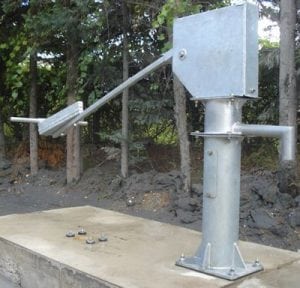
Agriculture
December 27, 2023
Implemented by
SOVEMA
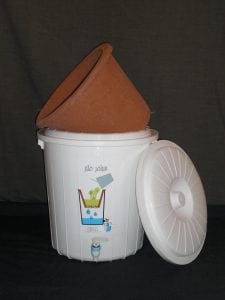
Agriculture
December 13, 2023
Implemented by
The Silver Filter Company Ltd
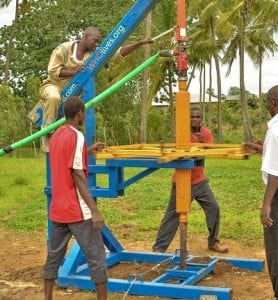
Agriculture
January 10, 2024
Implemented by
Brigham Young University
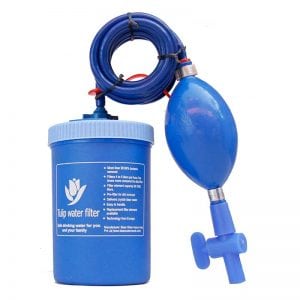
Agriculture
December 13, 2023
Implemented by
Basic Water Needs
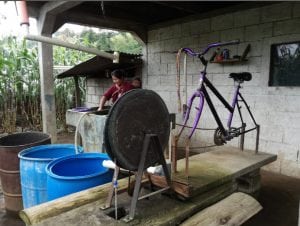
Agriculture
December 22, 2023
Implemented by
Bici-Tec
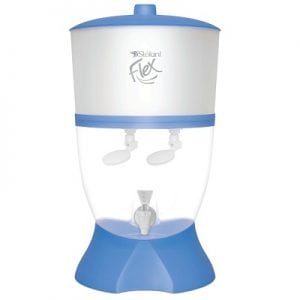
Agriculture
December 13, 2023
Implemented by
Ceramica Stefani Flex
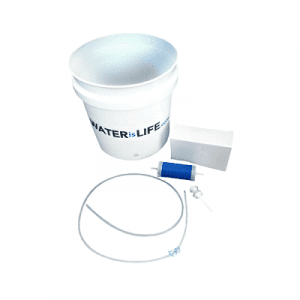
Agriculture
January 2, 2024
Implemented by
Water is Life
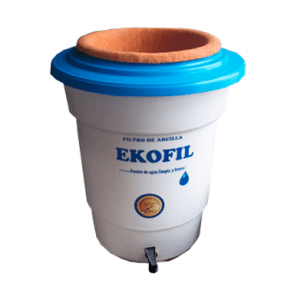
Agriculture
December 7, 2023
Implemented by
Ekofil
Have thoughts on how we can improve?
Give Us Feedback